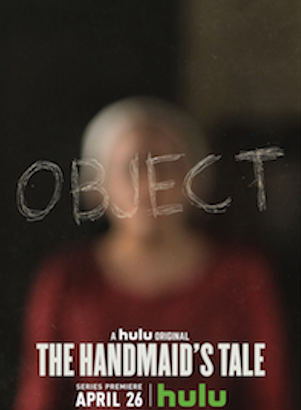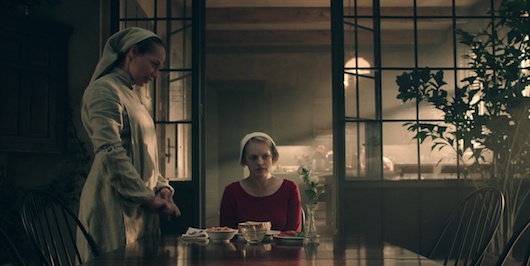
Snowglobe
by DICK CHENEY
The Handmaid's Tale
creator Bruce Miller
Hulu
 Perhaps some day we will know the true story of what happened on the inside of Elisabeth Moss' marriage to Fred Armisen. The pet names, the sex, the types of sex, the frequency of sex, who prepared breakfast for who, who answered the door, kept the dog back from the mailman. Who stroked the hair of who. Who threw out the old bread, when Fred decided Elisabeth was maybe more boring than someone he could be excited by in a long term partner, when Elisabeth felt safe to criticize Fred's late nights, the smell of tequila on his breath, whether he smelled old, who was jealous, who showed it, who stopped the game, who started it again. Who fell out of love.
Perhaps some day we will know the true story of what happened on the inside of Elisabeth Moss' marriage to Fred Armisen. The pet names, the sex, the types of sex, the frequency of sex, who prepared breakfast for who, who answered the door, kept the dog back from the mailman. Who stroked the hair of who. Who threw out the old bread, when Fred decided Elisabeth was maybe more boring than someone he could be excited by in a long term partner, when Elisabeth felt safe to criticize Fred's late nights, the smell of tequila on his breath, whether he smelled old, who was jealous, who showed it, who stopped the game, who started it again. Who fell out of love.
It feels like we will never know the real reasons that Offred (Elisabeth Moss) married her husband in The Handmaid's Tale. We are introduced to her family before all the events of the series happen in a scene where Offred, her husband Luke (O.T. Fagbenle) and her daughter (Jordana Blake) are watching the aquatic residents of an aquarium. It is an extremely well-trodden scene; it is meant to convey pair-bonding when there is no other connection between the people involved other than shared witness. It is the kind of empty stuff The Handmaid's Tale is full of; I never expected such a serious adaptation of Margaret Atwood's novel.

The real villains of The Handmaid's Tale are either Puritan values or modern American sexism. Neither is identified openly, because doing so would mean this is a real critique. It is not. Attacking the Puritans seems a broadside woefully out of date, given that any philosophy that allows individuals to survive in the wilderness without mass death should be admired for its efficacy. The English were really a very enterprising people overall.

Modern American sexism, too, bears no real relationship to what Offred discovers in the Republic of Gilead. In Gilead, the main vessels through which Offred experiences violence and discrimination are other women. She finds sympathetic companions in the men of her household, even though they are the only ones who hold any power. Offred never experiences catcalls, she is not objectified for her sexuality. She is used in her role because not very many women are capable of carrying children to term. The survival of the species is a far better reason for subjugation than "she looks hawt."
In her previous job, Offred explains that she was an "assistant books editor." This is her desk:

What naive scrumpet would seriously believe that this lifestyle could go on indefinitely without consequence? Offred's nostalgia for her old life seems entirely misplaced. Did she truly think that people would go on buying books and allowing her lifestyle to persist indefinitely? "The future is a fucking nightmare," proclaims one advertisement for the series, a statement which appears to refer to all elements of what is to come, including the ubiquity of Apple advertisements that subsidize your viewing of The Handmaid's Tale.

It has been several decades since The Handmaid's Tale was published, and Gilead is starting to not seem so bad in some ways. Yes, forced sex with her commander (Joseph Fiennes) is a drag, but at least she has a supportive community of other women who are going through the same thing. Alexis Bledel steals the show as Ofglen, a lesbian molecular biology professor who, you guessed it, talks very much. Bledel and Moss have an on-set competition going on as to which one of their respective eyeballs can protrude more prominently into the mise-en-scene. Moss wins pretty much every time.

It is kind of sad to see an actress who usually plays such prominent feminist characters reduced to romping meekly through each scene, although I guess this is sort of the point. In one particularly boring moment, Offred plays Scrabble with her commander. They shake hands afterwards, but instead of feeling bewildered by the interaction, as we are meant to, we merely start to judge Offred for feeling upset and rebellious towards all of this. I mean, when I think of how much her attic room would cost to rent if it were an apartment in New York, I want to cry. She doesn't pay for food or utilities, either. Is there any way we can all be transported to this dystopian future?
Dick Cheney is the senior contributor to This Recording. He is the author of your current dystopian present.
